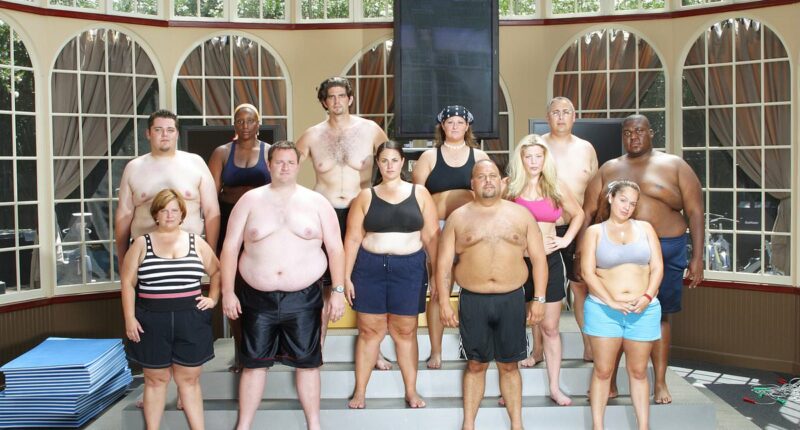Share this @internewscast.com
Previous participants from one of America’s toughest reality TV shows, The Biggest Loser, have allowed the cameras back in, unveiling the grim realities of shedding pounds for financial gain—from losing hair to experiencing blood in urine—in a new three-part Netflix documentary.
The show saw obese contestants—some of which were battling eating disorders—compete to lose the most weight for a $250,000 cash prize.
However, since the show was canceled in 2016, contestants now assert that no amount of money can compensate for their experiences—enduring punishing workout routines and insensitive food challenges while trying to survive on less than 1,000 calories daily.
Understanding that a drastically restricted diet was essential for significant change, some contestants confessed to consuming just 800 calories a day, while expending 6,000 during workouts.
Yet the producers—along with the coaches, who advocated a calorie deficit of around 1,000 for men and 800 for women—ignored these extremes, prioritizing the creation of compelling television and profit.
Now, past winner Ryan Benson, 56, who remarkably shed 126lbs (9 stone) on the show, shares the psychological trauma induced by the program’s reckless tactics—causing him to regain weight once the cameras ceased capturing their journey.
‘I lost all focus on getting healthy,’ he said. ‘It became all about winning.’
‘It hurt to do anything when you woke up in the morning’, he added.

Ryan Benson won the first series of The Biggest Loser after dropping nine stone on the show
‘I don’t know what they expected, but there were times that I felt they wanted us to fail. We were definitely exploited,’ he told People.
In the new documentary series, fitness coach Bob Harper concedes that there were relentless moments, but justifies his teaching approach for the sake of engaging reality TV.
‘What’s more important for weight loss?’ he asks. ‘We all know it’s diet, but that comes boring television.
‘You know what’s not boring television? To see us in a gym yelling and screaming. That’s inspirational. That’s good TV.’
Mr Benson, who was crowned the first winner of the show back in 2004, said he believes contestants were ‘set up to fail’ and crack under the extreme methods used to speed up weight loss for entertainment value.
‘Doctors tested our urine on the last day of our weigh in and they told me there was blood in mine because I was so dehydrated,’ he recalled.
Determined to win and keep the weight off, Mr Benson deprived himself of water for the last ten days of the show, drinking just enough lemon juice to stay hydrated and keep his metabolism ticking over—or so he thought.
Within just five days of the show ending, he had already put back on 2st 2lbs just from drinking water.

Ryan is now determined to turn his life around and lose weight in a healthy way, focusing on both the mental and physical side of weight loss and body image

The show saw obese individuals compete to lose the most amount of weight for a cash prize, with some contestants arguing they were being exploited for views
But the weight gain didn’t stop there. Behind closed doors Mr Benson piled on the pounds until he weighed over 25 stone, 2lbs heavier than he was before the show—proving that obesity is not just a weight problem that can be cured with gruelling workouts and restricted diets.
Shortly after the final episode, Mr Benson recalls his wife telling him nothing was worth what he was putting his body through.
‘It was really tough for me. I was lucky I never got hurt or injured myself,’ he added.
Recalling the guilt he felt after putting the weight back on, he said: ‘Anyone who struggles with weight in their life has issues they will carry with them .
‘But facing it in this very public way and feeling what did there… it kind of magnified the issues I already had.
‘You just feel guilty for going through this and not living up to what you did on the show, even 20 years later.’
Now the father-of-three is is trying to get back to a healthy weight, this time with a support network in place and a realistic workout routine and diet focusing on both the mental and physical side of weight loss—not just the number on the scale.
The new three-part Netflix documentary, called Fit for TV: The Reality of the Biggest Loser, premiered on August 15th, features interviews with both the producers and former contestants documenting the impact of the series.

The new three-part docuseries Fit for TV: The Reality of the Biggest Loser aired on Netflix on August 15
The post-mortem docuseries comes at a time where the premise of the original show would now be near impossible to replicate, given the advent of weight loss jabs like Ozempic and Mounjaro.
But in a similar vein, experts have warned that the results enjoyed by users of the jab are likely to be short-lived, if they do not maintain a healthy lifestyle after coming off the treatment.
A recent study found that even those taking Mounjaro—the so-called King Kong of weight loss jabs—regained almost half the weight they had lost on the drug when they switched to a placebo.
Whilst the study didn’t explain exactly why people pile the weight back on so fast, the researchers speculated it could be due to a phenomenon known as ‘weight cycling.’
This refers to the process of regaining weight after stopping treatment, and can be due to a number of factors such as hormonal changes in the gut.
Other experts have speculated the post-treatment weight gain could simply be because diets are hard, arguing that no self restraint is required when taking the drugs, so people don’t have effective ‘behavioural strategies in place’ when they stop taking them.

















